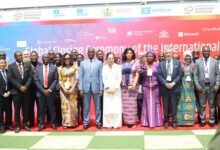Roadmap for informal economy ready

A roadmap to facilitate government’s agenda to formalise economic activities in the informal sector has been developed for consideration and approval of cabinet.
Designed by relevant sector ministries including Employment and Labour Relations and other stakeholders, the roadmap seeks to create an enabling environment that would ensure smooth transition of the informal economy into formality.
Minister of Employment and Labour Relations, Ignatius Baffour Awuah, stated that the roadmap was necessary to support efforts to expand pension coverage in the country, and ensure workers plan for their retirement.
He was speaking at a workshop on leveraging Switch Technology to increase pension to informal sector workers in Accra, yesterday.
The two-day workshop was organised by the National Pension Regulatory Authority (NPRA) in collaboration with the World Bank to present the Switch Technology, a computer networking device, which has been introduced in other countries to bridge gaps to support informal sector pension schemes, reach scale quicker and facilitate trustees to reach customers.
It was also to help participants understand how the Switch Technology could be setup, their operation, its advantages and governance.
The coverage of the informal sector under Tier-3, Mr Awuah said, was a challenge due to difficulties in reaching individuals in the sector, as well as establishing mechanisms to ensure contributions and technological innovation that allowed Trustees to grow to become a viable pension scheme.
In Ghana, he said only about 12 per cent of the country’s working population had access to pension schemes.
According to him, the informal sector, which employs about 80 per cent of the country’s workforce, was not covered by any of the traditional formal pension schemes, hence a large percentage of the elderly are not eligible for pension.
The Switch Technology, the minister said, would help in the collection of pension from the informal sector, which would lead to a significant increase of the pension fund assets, estimated to be worth GH₵20 billion in 2017.
Although the technology could help to extend pension coverage, he noted that high administrative charges would deter the vulnerable, especially low income earners from accepting it.
World Bank Country Manager, Pierre Laporte, observed that the presence of an engaged regulator, as well as initial product offerings and strong involvement of informal sector representatives in policy discussions, were complementary factors which could ensure extension of pension schemes to the informal sector.
The bank, he said, would provide technical support to the NPRA to develop the right strategy and approach that would establish sustainable and cost-effective informal sector pension schemes for the large productive labour force.
Mr Hayford Attah Krufi, Chief Executive Officer, NPRA, explained that the Switch Technology would be owned by corporate pension scheme trustees, but would be regulated by the NPRA.
The technology would give the trustees, licensed by the NPRA, access to the national database to make Tier-3 pension scheme accessible to those in the informal sector with innovative products, he stated.
BY CLAUDE NYARKO ADAMS and DEBORAH ASUMA






